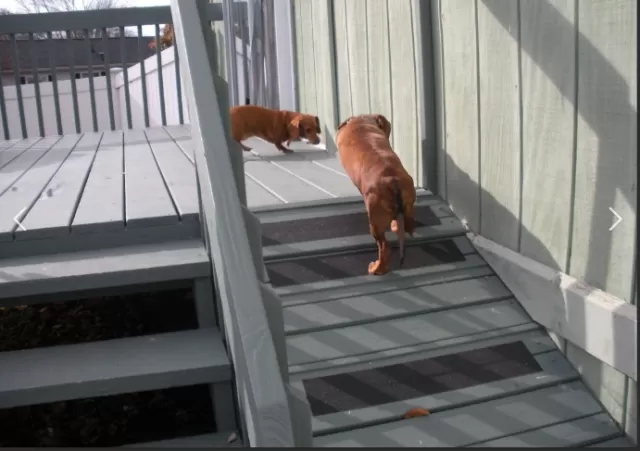Enhance Your Home for Senior Dogs with Vet-Recommended Tips. Welcoming a dog into your family brings immeasurable joy, and as your furry friend ages, it becomes essential to adapt your home to ensure their comfort. Whether your canine companion has been a part of your family for years or you recently adopted an older dog, Carly Fox, DVM, senior veterinarian at Schwarzman Animal Medical Center, highlights the importance of addressing common health concerns related to aging pets.
Observing your aging pet at home is key to identifying potential challenges, including mobility issues, cognitive decline, vision impairment, and incontinence. If you notice your dog struggling with tasks they once handled with ease, it’s time to make adjustments. Here are some tips to Make Your Home more comfortable for your senior dog:
Install Ramps: Help your dog navigate different levels in your home by installing ramps. This is particularly useful for areas with stairs, ensuring your pet can move around without straining their joints.
Invest in an Orthopedic Bed: Provide your senior dog with a comfortable and supportive place to rest by investing in an orthopedic bed. These beds are designed to relieve pressure on joints and promote better sleep.
Create a Cozy Corner: Set up a cozy corner in a quiet area of your home where your senior dog can retreat for some undisturbed rest. Include a soft bed, blankets, and perhaps a favorite toy.
Adapt Exercise Routine: Modify your dog’s exercise routine to accommodate their changing needs. Shorter, more frequent walks can be gentler on aging joints while still providing necessary mental and physical stimulation.
Provide Adequate Lighting: Improve visibility for a senior dog with vision impairment by ensuring well-lit pathways in your home. Consider using nightlights in common areas to prevent disorientation.
Maintain a Consistent Routine: Senior dogs often thrive on routine. Establishing a consistent schedule for feeding, walks, and playtime can provide a sense of security.
By making these adjustments, you not only enhance your senior dog’s quality of life but also contribute to their overall well-being. Creating a comfortable and supportive environment allows your furry friend to age gracefully, enjoying the love and care your home provides throughout their golden years.
BenchMade Modern “Skinny Fat” Sofa: Elevate Your Living Space with Opulent Comfort and Pet-Proof Resilience

Step into a realm of opulence and sophistication with the BenchMade Modern “Skinny Fat” Sofa—an indulgence that transcends the ordinary.
Acknowledging its position as a pricier option, this couch stands as a testament to the art of furniture craftsmanship, offering a lavish investment for those who seek enduring elegance and practicality tailored to both human and pet comfort.
Setting this sofa apart is the extensive range of performance fabrics curated by BenchMade Modern.
As boldly declared on the company’s website, these fabrics are “pet-proof, wine-proof, kid-proof, pizza-proof, and everything-else-proof. ” This unparalleled level of durability ensures that the sofa remains impervious to the occasional spills, messes, and vivacity that come with sharing your home with pets.
BenchMade Modern’s commitment to personalization shines through, allowing you to tailor the couch to your exact specifications.
Whether opting for the “Skinny Fat” model or choosing something simpler or more compact, the customization options enable you to create the perfect centerpiece for your living space.
While the price tag may represent a splurge, the assurance of a quick-to-clean, pet-friendly, and family-friendly piece of furniture makes the BenchMade Modern “Skinny Fat” Sofa an investment in enduring comfort and aesthetic allure.
Envision cozy movie nights with the entire family, furry friends included, as you bask in the luxurious embrace of this sofa’s opulent design and pet-proof performance.
Enhance Your Dog\’s Sleeping Space with Thoughtful Adjustments

While it’s essential to respect your dog’s preferred sleep spot, you can improve their comfort by making subtle modifications.
Dr. Fox suggests several ways to achieve this without dramatically altering their chosen location.
Upgrade the Bed: Consider introducing an orthopedic dog bed to provide extra support and comfort.
This can be especially beneficial for older dogs or those with specific health concerns.
Ensure Comfort: Check for drafts or extreme heat in the sleeping area.
Adjust the surroundings to maintain a comfortable temperature, ensuring your dog is neither too cold nor too warm during their rest.
Proximity to Essentials: Place water and food bowls close to your dog’s sleeping spot for easy access.
This ensures they can Stay Hydrated and have a snack without venturing too far.
Accessibility Solutions: If your dog enjoys sleeping on furniture like a couch or chair, make it more accessible by adding a ramp.
This thoughtful addition helps pets, especially those with mobility challenges, reach their preferred spots with ease.
By making these subtle adjustments, you enhance your dog’s sleeping space, promoting their well-being and ensuring they have a cozy and accessible retreat tailored to their preferences.
Facilitate Access for Your Senior Pet with Dog Stairs
Ease your senior pet’s daily activities by installing dog stairs, a practical solution suggested by Dr.
Richter. These stairs prove particularly beneficial for helping your furry friend reach favorite spots that may be challenging to access due to age-related mobility issues.
Access to High Surfaces: Dog stairs are particularly useful for allowing your senior pet to reach elevated areas like the owner’s bed, couch, or even the car.
This can enhance their sense of independence and keep them close to you during relaxation times.
Reduced Strain on Joints: For pets finding it difficult to jump onto higher surfaces, stairs provide a gentle incline that reduces strain on their joints.
This is especially valuable for dogs experiencing arthritis or other mobility issues associated with aging.
Training Transition: While installing dog stairs is a practical solution, it’s important to note that your senior pet may require some training to get accustomed to using them.
Be patient and encourage positive behavior by offering treats or praise as they learn to navigate the stairs confidently.
By introducing dog stairs into your home, you create a supportive environment for your senior pet, allowing them to access their favorite spots comfortably and safely.
This simple addition can significantly contribute to enhancing their overall well-being and maintaining a sense of normalcy in their daily activities.
Enhance Safety and Comfort for Your Senior Dog with Night Lights

Address the challenges of aging-related vision and hearing impairment in your elderly dog by incorporating night lights into their living space, a recommendation from Dr.
Fox. As pets age, issues such as nuclear sclerosis and cataracts can contribute to difficulties in seeing, particularly in low-light conditions.
Here’s how night lights can be beneficial:.
Prevent Injuries: Senior dogs may struggle to navigate their surroundings in the dark, increasing the risk of bumps or falls.
Night lights provide gentle illumination, reducing the chances of accidents and ensuring your pet moves about safely.
Mitigate Vision Impairment: Dogs with vision issues can find it especially challenging to navigate at night.
Night lights offer a helpful reference point, making it easier for your elderly pet to recognize their surroundings and move confidently.
Create a Sense of Security: Illuminating the area where your senior dog sleeps or frequents provides a comforting environment.
Night lights can help alleviate anxiety by making the space familiar and easily navigable.
Facilitate Independence: Enhanced visibility allows your senior dog to maintain a level of independence, encouraging them to move around and explore their surroundings with confidence.
By strategically placing night lights in areas your senior dog frequents, you contribute to their safety, comfort, and overall well-being, making their living environment more accommodating as they navigate the challenges associated with aging.
*The information is for reference only.